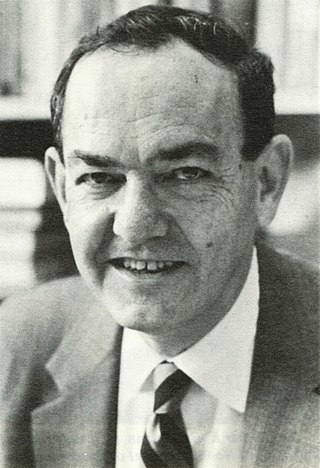Related Research Articles

Herbert Alexander Simon was an American scholar whose work influenced the fields of computer science, economics, and cognitive psychology. His primary research interest was decision-making within organizations and he is best known for the theories of "bounded rationality" and "satisficing". He received the Turing Award in 1975 and the Nobel Memorial Prize in Economic Sciences in 1978. His research was noted for its interdisciplinary nature, spanning the fields of cognitive science, computer science, public administration, management, and political science. He was at Carnegie Mellon University for most of his career, from 1949 to 2001, where he helped found the Carnegie Mellon School of Computer Science, one of the first such departments in the world.
Psychometrics is a field of study within psychology concerned with the theory and technique of measurement. Psychometrics generally covers specialized fields within psychology and education devoted to testing, measurement, assessment, and related activities. Psychometrics is concerned with the objective measurement of latent constructs that cannot be directly observed. Examples of latent constructs include intelligence, introversion, mental disorders, and educational achievement. The levels of individuals on nonobservable latent variables are inferred through mathematical modeling based on what is observed from individuals' responses to items on tests and scales.

Daniel Kahneman was an Israeli-American psychologist best known for his work on the psychology of judgment and decision-making as well as behavioral economics, for which he was awarded the 2002 Nobel Memorial Prize in Economic Sciences together with Vernon L. Smith. Kahneman's published empirical findings challenge the assumption of human rationality prevailing in modern economic theory. Kahneman became known as the "grandfather of behavioral economics."

Behavioral economics is the study of the psychological factors involved in the decisions of individuals or institutions, and how these decisions deviate from those implied by traditional economic theory.
Mathematical psychology is an approach to psychological research that is based on mathematical modeling of perceptual, thought, cognitive and motor processes, and on the establishment of law-like rules that relate quantifiable stimulus characteristics with quantifiable behavior. The mathematical approach is used with the goal of deriving hypotheses that are more exact and thus yield stricter empirical validations. There are five major research areas in mathematical psychology: learning and memory, perception and psychophysics, choice and decision-making, language and thinking, and measurement and scaling.
Quantitative psychology is a field of scientific study that focuses on the mathematical modeling, research design and methodology, and statistical analysis of psychological processes. It includes tests and other devices for measuring cognitive abilities. Quantitative psychologists develop and analyze a wide variety of research methods, including those of psychometrics, a field concerned with the theory and technique of psychological measurement.

Barry Schwartz is an American psychologist. Schwartz is the Dorwin Cartwright Emeritus Professor of Social Theory and Social Action at Swarthmore College and since 2016 has been visiting professor at the University of California, Berkeley. His work focuses on the intersection of psychology and economics. He frequently publishes editorials in The New York Times, applying his research in psychology to current events. Schwartz's research addresses morality, decision-making and the inter-relationships between behavioral science and society. His books criticize certain philosophical roots of Western societies and expose underlying myths common in both lay and academic psychological theories. In particular, he is a critic of the "rational economic man" model in both psychology and economics. Schwartz studied under David Richmond Williams for his PhD at the University of Pennsylvania where he was a predoctoral fellow with National Science Foundation.
The following outline is provided as an overview of and topical guide to psychology:

Cecil Randy Reynolds is an American psychology professor best known for his work in psychological testing and assessment.
Frank L. Schmidt was an American psychology professor at the University of Iowa known for his work in personnel selection and employment testing. Schmidt was a researcher in the area of industrial and organizational psychology with the most number of publications in the two major journals in the 1980s. In the 1990s he was the 4th most published researcher in Journal of Applied Psychology (JAP) and Personnel Psychology (PP), the two principal publications in the field of industrial-organizational psychology. He was also winner of the first Dunnette Prize, the most prestigious lifetime achievement award given by the Society for Industrial and Organizational Psychology "to honor living individuals whose work has significantly expanded knowledge of the causal significance of individual differences through advanced research, development, and/or application".

Anne Anastasi was an American psychologist best known for her pioneering development of psychometrics. Her generative work, Psychological Testing, remains a classic text in which she drew attention to the individual being tested and therefore to the responsibilities of the testers. She called for them to go beyond test scores, to search the assessed individual's history to help them to better understand their own results and themselves.
Peter Richard Killeen is an American psychologist who has made major contributions to a number of fields in the behavioral sciences. He has been one of the few premier contributors in quantitative analysis of behavior, and memory.

Perry N. Halkitis is an American of Greek ancestry public health psychologist and applied statistician known for his research on the health of LGBT populations with an emphasis on HIV/AIDS, substance use, and mental health. Perry is Dean and Professor of Biostatistics, Health Education, and Behavioral Science at the Rutgers School of Public Health.
The following outline is provided as an overview of and topical guide to human intelligence:

Eldar Shafir is an American behavioral scientist, and the co-author of Scarcity: Why Having Too Little Means So Much. He is the Class of 1987 Professor in Behavioral Science and Public Policy; Professor of Psychology and Public Affairs at Princeton University Department of Psychology and the Princeton School of Public and International Affairs, and Inaugural Director of Princeton’s Kahneman-Treisman Center for Behavioral Science and Public Policy.
The Exeter Prize is an economics prize of the University of Exeter Business School, which has been awarded since 2012. The Exeter Prize is awarded to the best paper published in the previous calendar year in a peer-reviewed journal in the fields of Experimental Economics, Decision Theory and Behavioural Economics.
Jeffrey Scott Tanaka was an American psychologist and statistician, known for his work in educational psychology, social psychology and various fields of statistics including structural equation modeling.
Jerome Robert Busemeyer is a Distinguished Professor at Indiana University Bloomington in the Department of Psychological & Brain Sciences and Cognitive Science Program.
Boris Maciejovsky is an Austrian behavioral scientist, and an Associate Professor of Management at the School of Business at the University of California, Riverside. He is also the founder and managing partner at Greenleaf Analytics LLC, a behavioral management consultancy. His research focuses on behavioral economics and organizational decision-making.
Amnon Rapoport (1936-2022) was an Israeli-born quantitative psychologist who was the Eller Professor Emeritus of Management and Organizations at the Eller College of Management at the University of Arizona. His research focused on experimental studies of interactive decision-making behavior. He died on December 6, 2022, after more than six decades of academic teaching, research, and service.
References
- ↑ "David V. Budescu, Education". Archived from the original on 2009-06-24. Retrieved 2009-02-22.
- ↑ "Contemporary Psychological Research on Social Dilemmas - Cambridge University Press". www.cambridge.org.
- ↑ "University of Exeter Business School: Exeter Prize".
- ↑ Fordham. "Fordham Homepage". Fordham University: David V. Budescu. Retrieved 2021-06-03.
- ↑ "Google Scholar David Budescu" . Retrieved 1 May 2022.
- ↑ APA. "Decision". APA. Retrieved 2021-06-03.
- ↑ Fordham. "Fordham Homepage". Fordham.edu. Retrieved 2020-04-22.